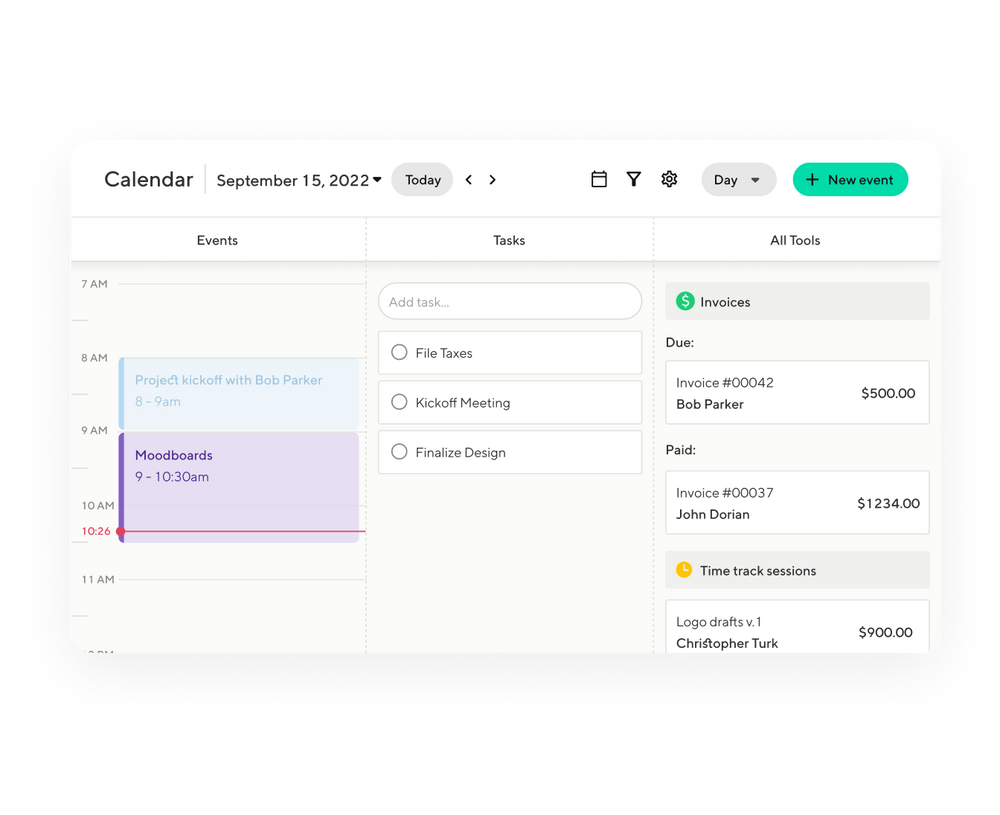The 1099s are informational tax forms for taxpayers and the Internal Revenues Service. These forms record and report non-employee compensation, and so they are vital when tax filing and hence the need to send and file them on time.
The IRS provides clear deadlines for sending and filing these forms that both the employer and independent contractor need to observe. The actual deadline depends on the specific form 1099 you are sending or filing, given there are at least 20 types.
This guide explains the filing due date for different 1099 forms and explains other important things freelancers and independent contractors need to know about these tax forms.
Key IRS form 1099 deadlines an independent contractor should know
The IRS will always publish two types of deadline dates for all the 1099s. Taxpayers and clients need to understand both to ensure they file returns for the applicable tax year on time.
1. Due date for submission to taxpayers
Clients and businesses have an obligation to send all the qualified 1099s to taxpayers in time for them to use when filing their taxes.
For most 1099s, the deadline for clients to send the forms is January 31, 2024. If the date falls on a weekend, the deadline will be extended to the following Monday or the next business day if Monday is a public holiday.
There are certain exceptions for this deadline, such as Form-MISC with some data in box 8 or 10, but this is explained in more detail in the next section that looks at due dates for specific 1099 types.

2. Due date for submission to the IRS
The submission date to the IRS will be different for the clients and taxpayers. The clients and small businesses should submit the forms to the taxpayer by January 31 and make sure they send a copy to the IRS by February 28.
The deadline for taxpayer submissions will depend on whether you are sending the forms by mail or using the E-file option.
The IRS requires most 1099s to be submitted by February 28, 2024 through the mail and by March 31, 2024 if you file the form electronically, except 1099-NEC, which is submitted by January 31.
Due date for different 1099 forms
Although there are several types of 1099s, most non-employees will often only need to deal with a few of them, like the form 1099-NEC and form 1099-MISC. Therefore, you only need to know the deadlines for the specific form types that you are likely to get from your clients.
Here is an overview of the filing deadlines for 5 of the most common 1099s.
1. 1099-NEC
The 1099-NEC is the most common 1099 form that most freelancers and independent workers will get to report their nonemployee compensation. It reports all non-employee compensation over $600, including fees, commissions and any other kind of compensation.
Clients and businesses that pay over $600 to an employee not part of their organization have to send them a Form 1099-NEC by January 31. The recipients filing these forms via mails or E-filing must do it by January 31, 2024.
2. 1099-MISC
Before 2020, the 1099-MISC reported all non-employee compensation, but it has since been replaced by the 1099-NEC. However, the form is still used to report all miscellaneous service payments that are not nonemployee compensation. The form will report payments like rents, prizes and awards.
Clients have to send the forms to recipients by January 31st or February 15th if the forms also include data in boxes 8 or 10. The taxpayers have to file the forms by February 28th for mail filing, and March 31st is the filing deadline for E-filing.
3. 1099-INT
The 1099-INT will be sent to taxpayers that earn more than $10 interest income payments by banks and other financial institutions like brokerage firms.
Recipients of this form have to get it by January 31st and file it by February 28th, if they are paper filing. The deadline for the forms filed electronically is March 31st.
4. 1099-DIV
1099-DIV does not report wages, but it will record earnings for nonemployees like other forms. Earnings recorded on this form are from dividends generated within the tax year.
These forms will originate from brokerage firms, and it is important to remember that dividend income is taxable, so it is crucial to report it accurately.
Brokerage firms should send the 1099-DIV to taxpayers by January 31, and the filing date by mail is February 28th, while the IRS requires you to do E-filing by March 31st.

5. 1099-B, 1099-S and 1099-R
There are other forms you might receive as a freelance taxpayer such as 1099-B, 1099-S and 1099-R that will record and report different kinds of earnings.
The 1099-B will record transactions from brokers, such as the sale of stock, and 1099-S is for real estate transactions, and you will get it if you close a sale in the calendar year. 1099-R records distribution of payment from a retirement plan or pension.
If you are expecting one of these forms, the deadline for their receipt is January 31, and the taxpayer will have to file them by February 28 or March 31 for E-file.
State-specific 1099 due dates for the tax year
A majority of states keep their tax deadlines similar to the federal government. However, tax filing deadlines can still differ among states, given the differences in filing requirements. Therefore, it is important to acquaint yourself with the specific regulations of the states where you file your taxes.
There are around 4 groups of states based on their 1099 filing requirements:
1. Combined state/federal program
Some states have a combined program with the federal government for reporting 1099s. This program is highly convenient for taxpayers and businesses as it makes filing 1099s easy.
The IRS will share all the common 1099 forms like 1099-NEC, 1099-MISC, 1099-INT, 1099-DIV and 1099-R with the states, so the business or taxpayer will not have to send them separately.
Most US states use this program, including Alabama, Arizona, California, Hawaii, Mississippi and Wisconsin.
2. States with no filing requirement for form 1099s
Some states will not have any filing requirement for common 1099s like 1099-MISC, so you only need to file with the IRS.
States that will not require you to file these forms include Alaska, Illinois, Nevada, New York, Tennessee, Washington and Wyoming.
3. States requiring 1099 MISC filing for withheld taxes
A few states have a conditional 1099-MISC filing whereby the taxpayers are only required to file these forms if they withheld state taxes.
Some of the states that will require you to file the 1099-MISC for withheld taxes are Kentucky, Rhode Island, West Virginia and Utah.
4. States with unclear filing requirements
Although most states have clear tax requirements for everything, including filing form 1099s, some do not make things clear enough. Others also require taxpayers to file the 1099-MISC separately.
States under this category include Oklahoma, Iowa, Massachusetts, Oregon and Pennsylvania. Taxpayers need to know which group their state falls in by doing extensive research before the tax season, as this ensures they understand how to treat 1099s when filing tax returns.
What are the late filing penalties for independent contractors
Failing to file any form with the IRS when required can be very costly as it often attracts penalties. Also, these penalties accrue interest from the day they are charged. Therefore the longer you wait before paying them, the larger your tax bill.
The good news is the penalties are mostly for clients that have an obligation to prepare and send the forms to both the IRS and the small business independent contractor.
As an independent contractor, you are unlikely to get a fine for failing to submit your 1099s on time, provided you capture all your earnings information accurately.
That said, employers that do not submit the 1099s in time will pay fines of anywhere from $60 and $310. If you file the forms less than 30 days late, you will pay $60 per form. If you wait longer than 30 days but pay before August 1, you will pay $120 for every form.
Those who fail to meet the August 1 deadline will pay $310 for each form, and the maximum penalty can be as much as $1,261,000.
Therefore, if for any reason you are unable to file the 1099s on time, you should request an extension to avoid paying the penalty since the IRS allows you to apply for additional time.
Conclusion
As a taxpayer, it is important to make sure that you submit all your 1099s on time to avoid unnecessary fines. The IRS makes the deadlines for all the 1099s clear, so you should never have difficulties determining when to send the files.
A simple way to ensure you file your 1099s on time is by asking any sole proprietor or freelancer you deal with to fill out the W-9. The form ensures you have their taxpayer identification number and any other important information you need to prepare and file 1099s.




